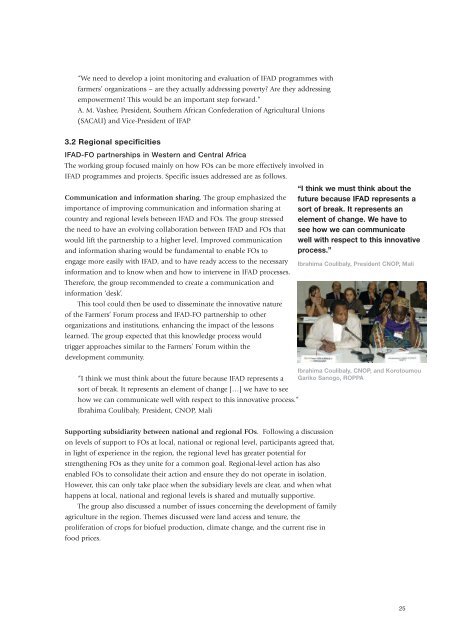Report of the 2008 global meeting - IFAD
Report of the 2008 global meeting - IFAD
Report of the 2008 global meeting - IFAD
Create successful ePaper yourself
Turn your PDF publications into a flip-book with our unique Google optimized e-Paper software.
“We need to develop a joint monitoring and evaluation <strong>of</strong> <strong>IFAD</strong> programmes with<br />
farmers’ organizations – are <strong>the</strong>y actually addressing poverty? Are <strong>the</strong>y addressing<br />
empowerment? This would be an important step forward.”<br />
A. M. Vashee, President, Sou<strong>the</strong>rn African Confederation <strong>of</strong> Agricultural Unions<br />
(SACAU) and Vice-President <strong>of</strong> IFAP<br />
3.2 Regional specificities<br />
<strong>IFAD</strong>-FO partnerships in Western and Central Africa<br />
The working group focused mainly on how FOs can be more effectively involved in<br />
<strong>IFAD</strong> programmes and projects. Specific issues addressed are as follows.<br />
“I think we must think about <strong>the</strong><br />
Communication and information sharing. The group emphasized <strong>the</strong> future because <strong>IFAD</strong> represents a<br />
importance <strong>of</strong> improving communication and information sharing at sort <strong>of</strong> break. It represents an<br />
country and regional levels between <strong>IFAD</strong> and FOs. The group stressed element <strong>of</strong> change. We have to<br />
<strong>the</strong> need to have an evolving collaboration between <strong>IFAD</strong> and FOs that see how we can communicate<br />
would lift <strong>the</strong> partnership to a higher level. Improved communication well with respect to this innovative<br />
and information sharing would be fundamental to enable FOs to process.”<br />
engage more easily with <strong>IFAD</strong>, and to have ready access to <strong>the</strong> necessary Ibrahima Coulibaly, President CNOP, Mali<br />
information and to know when and how to intervene in <strong>IFAD</strong> processes.<br />
Therefore, <strong>the</strong> group recommended to create a communication and<br />
information ‘desk’.<br />
This tool could <strong>the</strong>n be used to disseminate <strong>the</strong> innovative nature<br />
<strong>of</strong> <strong>the</strong> Farmers’ Forum process and <strong>IFAD</strong>-FO partnership to o<strong>the</strong>r<br />
organizations and institutions, enhancing <strong>the</strong> impact <strong>of</strong> <strong>the</strong> lessons<br />
learned. The group expected that this knowledge process would<br />
trigger approaches similar to <strong>the</strong> Farmers’ Forum within <strong>the</strong><br />
development community.<br />
Ibrahima Coulibaly, CNOP, and Korotoumou<br />
“I think we must think about <strong>the</strong> future because <strong>IFAD</strong> represents a Gariko Sanogo, ROPPA<br />
sort <strong>of</strong> break. It represents an element <strong>of</strong> change […] we have to see<br />
how we can communicate well with respect to this innovative process.”<br />
Ibrahima Coulibaly, President, CNOP, Mali<br />
Supporting subsidiarity between national and regional FOs. Following a discussion<br />
on levels <strong>of</strong> support to FOs at local, national or regional level, participants agreed that,<br />
in light <strong>of</strong> experience in <strong>the</strong> region, <strong>the</strong> regional level has greater potential for<br />
streng<strong>the</strong>ning FOs as <strong>the</strong>y unite for a common goal. Regional-level action has also<br />
enabled FOs to consolidate <strong>the</strong>ir action and ensure <strong>the</strong>y do not operate in isolation.<br />
However, this can only take place when <strong>the</strong> subsidiary levels are clear, and when what<br />
happens at local, national and regional levels is shared and mutually supportive.<br />
The group also discussed a number <strong>of</strong> issues concerning <strong>the</strong> development <strong>of</strong> family<br />
agriculture in <strong>the</strong> region. Themes discussed were land access and tenure, <strong>the</strong><br />
proliferation <strong>of</strong> crops for bi<strong>of</strong>uel production, climate change, and <strong>the</strong> current rise in<br />
food prices.<br />
25

















